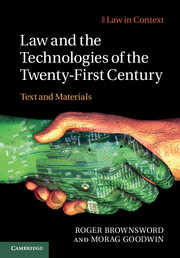Book contents
- Frontmatter
- Contents
- Acknowledgements
- Miscellaneous Frontmatter
- Abbreviations
- Table of cases
- Table of statutes and other public documents
- Part I General introduction
- Part II Regulatory prudence and precaution
- Part III Regulatory legitimacy
- 8 Key boundary-marking concepts
- 9 Human rights as boundary markers
- 10 A look at procedural legitimacy: the role of public participation in technology regulation
- Part IV Regulatory effectiveness
- 11 Regulatory effectiveness I
- 12 Regulatory effectiveness II: failure by regulators
- 13 Regulatory effectiveness III: resistance by regulatees
- 14 Regulatory effectiveness IV: third-party interference and disruptive externalities
- Part V Regulatory connection
- Concluding overview
- Index
- References
13 - Regulatory effectiveness III: resistance by regulatees
from Part IV - Regulatory effectiveness
Published online by Cambridge University Press: 05 August 2012
- Frontmatter
- Contents
- Acknowledgements
- Miscellaneous Frontmatter
- Abbreviations
- Table of cases
- Table of statutes and other public documents
- Part I General introduction
- Part II Regulatory prudence and precaution
- Part III Regulatory legitimacy
- 8 Key boundary-marking concepts
- 9 Human rights as boundary markers
- 10 A look at procedural legitimacy: the role of public participation in technology regulation
- Part IV Regulatory effectiveness
- 11 Regulatory effectiveness I
- 12 Regulatory effectiveness II: failure by regulators
- 13 Regulatory effectiveness III: resistance by regulatees
- 14 Regulatory effectiveness IV: third-party interference and disruptive externalities
- Part V Regulatory connection
- Concluding overview
- Index
- References
Summary
Introduction
Commentators on the effectiveness of law in particular, and regulation in general, agree that regulators tend to do better when they act with the backing of regulatees (with a consensus rather than without it). If regulatees do not perceive the purpose that underlies a particular regulatory intervention as being in either their prudential or their moral interests (let alone in both their prudential and moral interests), the motivation for compliance is weakened. The use of marijuana as a recreational drug is the textbook example. Thus:
The fact remains … that marijuana use continues to be illegal in most parts of the world, even as people continue to break these laws with apparent impunity. And there is no resolution in sight. The persistence of marijuana use remains a prime example of how our legal system is based on an implicit social contract, and how the laws on the books can cease to matter when a large percentage of people decide they want to do something that may not be acceptable under the law.
Similarly, experience (especially in the United States) with regulatory prohibitions on alcohol suggests not only that legal interventions that overstep the mark will be ineffective but pregnant with corrupting and secondary criminalising effects. However, before we can make the most of this insight, we need to understand much more about the roots of regulatee resistance, whether it be economic, cultural, professional or moral in nature.
One of the key factors that will determine the penetration of a law is whether there is any economic resistance: quite simply, if regulatees act like rational economic actors, they will tend to view law as a tax on certain kinds of conduct. If non-compliance is the better economic option, the logic for such regulatees is to disobey and (sometimes) pay.
- Type
- Chapter
- Information
- Law and the Technologies of the Twenty-First CenturyText and Materials, pp. 318 - 341Publisher: Cambridge University PressPrint publication year: 2012

